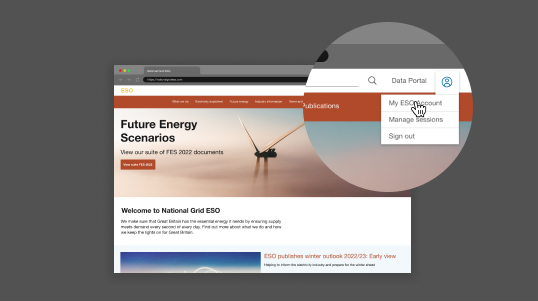
IWD2021 - It’s great that we have a lot of women in senior roles which shows me women like me can progress.
5 Mar 2021 - 4 minute read
To mark International Women’s Day, we spoke to Commercial Codes Change manager Jenny Doherty. Jenny joined us on the graduate scheme eight years ago and tells us about her career at the ESO.
How did you come to join the ESO?
I studied German and Business at Newcastle University and wondered what I’d do after my degree.
Looking at the Times top 100 graduate schemes, I saw that the National Grid were ranked highly and gave the opportunity to rotate through different placements. I applied and haven’t looked back!
I’ve now been in the business for eight years. I think the fact that I’ve done a few roles is a selling point and something I’ve thoroughly enjoyed.
When I began most of my roles I certainly wasn’t a subject matter expect, and it’s amazing that people in the ESO have supported and put the trust in me to be able to succeed at each job. It also means I’ve learnt so much about both the business and the industry.
My first role was looking at the potential introduction of onshore competition. I then moved to the customer team before leading on the ESO’s new identity through legal separation – we undertook a total review of how the new ESO would look and engage externally post separation and this included a new website and brand identity.
Can you tell us about your current role?
Now I look at charges, and codes (the rules and regulations that every organisation must follow in the electricity industry).
Throughout all my roles I’ve focussed on stakeholder engagement and this continues with codes. If we look at charges, it is a difficult balance as the total pot that we need to recover is the same, so if somebody’s charge decreases, it means somebody else’s increases. I therefore focus on what is the right overall outcome for end consumers.
A lot of my work involves close working with Ofgem, generators, suppliers and network companies about what future reform looks like. One of the big things from last year was looking at capping balancing services costs, where the ESO provided financial support for suppliers and generators against extreme and unforeseen costs due to additional balancing actions taken during COVID.
How has the pandemic impacted you?
From a work perspective, compared to some of my colleagues, it hasn’t been too bad. All of my work and the engagement required for code modifications can continue virtually.
During the first lockdown I worked longer hours, partly because there was nothing else to do! I now balance my time a lot better and work similar hours to what I used to do in the office.
We have a daily morning stand up so it’s nice to see the rest of the team and have a general discussion that’s not necessarily about work.
I’ve found it helps my wellbeing to take some of my team calls whilst having a walk, to make sure I get away from the desk. Within our department we also now have meeting free Wednesday afternoons. This means I can get some admin done which makes a huge difference.
I don’t have children, but it’s good to see the flexibility the business offers to colleagues who need it. It’s important we each remember people are working differently.
For example, a colleague may not reply to me in the day as they’re home schooling but respond late in the evening. That doesn’t mean there is an expectation that I have to email back immediately.
On a personal level, I have had the unfortunate experience of visiting family on the COVID intensive care ward in hospital, and have seen the devastating impacts that COVID is having. I cannot be more grateful to the wonderful NHS staff who put themselves at risk every day, to provide amazing care to those that need it the most.
Today we’re celebrating International Women’s Day. How do you feel as a woman in the ESO?
When I go to groups outside the ESO I’m often the only woman, or one of two or three. It doesn’t bother me because I’m the person there to do my job and I’ve never felt that I’m judged because I’m a woman.
It’s a positive thing that my gender has never held me back. It’s great that we have a lot of women in senior roles which shows me women like me can progress.
There are sometimes stereotypes that we need to move on from. It may sound minor, but an example is when an assumption has been made that women would want a salad at an external industry lunch which isn’t necessarily true.
Overall, the ESO is doing a great job of increasing diversity. I fully believe that the ESO will give the right person the job, no matter what their gender, ethnicity or disability.
